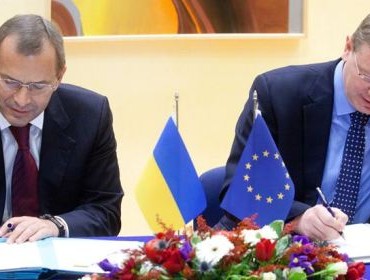Article by Oksana Pyliavets, analyst of the Institute of World Policy for EuropeanVoice.comYour recent article by Aleksander Kwasniewski, a former president of Poland, was an excellent reminder that the EU should be providing fuller and deeper support to Ukraine (“A hub in need of stronger spokes” , EuropeanVoice.com, 17 March).
The EU currently has a unique opportunity to prove whether it really regards the relationship with Ukraine as a strategic priority. Indeed, this may be its last chance to do so. If the EU wastes the chance, Ukraine’s future as a stable democracy looks uncertain.
That opportunity is agreement on a free-trade area with Ukraine that – as the ritual adjectives suggest – truly is “deep and comprehensive”. Why is this so important?
Firstly, as Kwasniewski rightly pointed out, it would anchor Ukraine within the wider European market, which could be beneficial for both parties.
Secondly, and more importantly, it would have a strategic geopolitical significance. European leaders’ doubts and hesitation about Ukraine are well-founded and based on an experience of disillusionment, misunderstandings and failed expectations. However, the EU should not ignore the obvious signs that there is a strong political will in Ukraine to have the free-trade agreement signed this year. Ukraine has been seeking to move negotiations up a gear: Andriy Kliuiev, the first deputy prime minister, has visited Brussels several times to outline a possible compromise, and at the end of March another high-level delegation, including Kliuiev and Foreign Minister Kostiantyn Hryshchenko, visited Brussels again.
The EU should not take these steps for granted. There are strong interest groups in Ukraine (especially the agricultural lobby) that oppose a free-trade agreement and they have increased their lobbying considerably. Russia too has intensified its political and economic efforts to restrain Ukraine from European integration. Prime Minister Vladimir Putin could not have been clearer when on 16 March he said that Russia would “be forced to start building [a trade] border” if Ukraine and the EU were to establish a free-trade area.
Some pundits have previously claimed that Russia is strongly against Ukraine’s membership of NATO, but quite supportive of its European integration; the current situation proves them wrong. When Ukraine’s integration with Europe meant no more than talks, Russia could handle it, but the Kremlin has been in a state of permanent irritation since Ukraine demanded more action. Russia still nurtures hopes of involving Ukraine in a customs union along with Kazakhstan and Belarus.
The EU should keep this in mind when negotiating with Ukraine. With due respect to the “mandate” of European diplomats (the explanation always offered by European diplomats when explaining why the negotiations cannot move on), the EU’s position could be more flexible. The Russian authorities habitually exploit the hesitations and disagreements within the EU. The EU should accelerate Ukraine’s integration, by at least suggesting compromises at the April round of negotiations on the free-trade agreement.
The Ukrainian authorities would appreciate these efforts, mostly because they have a strong desire to have the free-trade agreement signed triumphantly at the EU-Ukraine summit, which is likely to take place in Kiev in December.
Source of the publication




Comments theme
Comments themeComments themeComments themeComments themeComments themeComments themeComments themeComments themeComments themeComments themeComments themeComments themeComments themeComments themeComments themeComments themeComments themeComments themeComments themeComments.